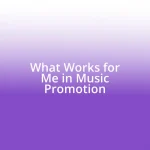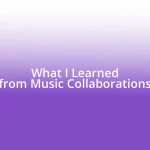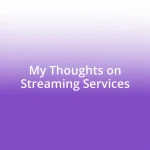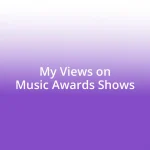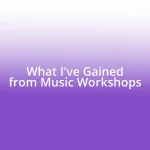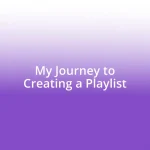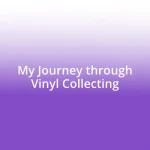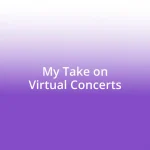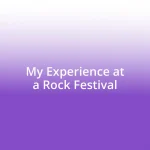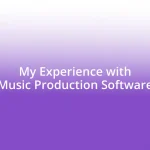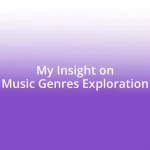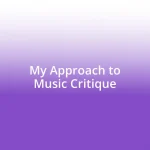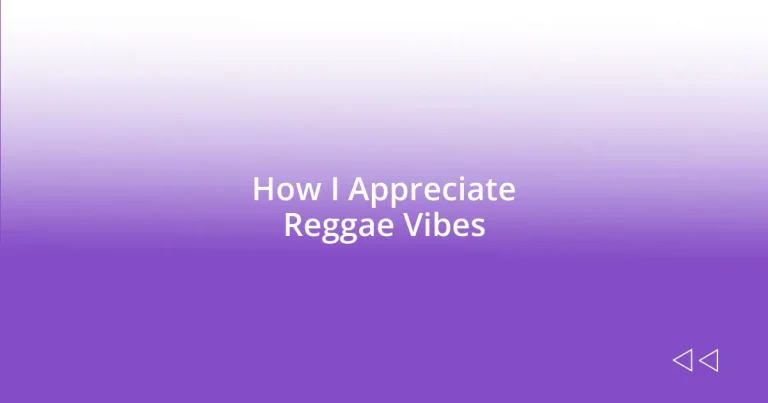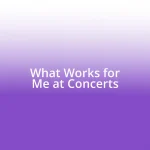Key takeaways:
- Reggae is a profound expression of cultural identity, resilience, and social justice, bringing people together through its rhythms and messages.
- Key elements of reggae include its distinctive rhythm, instrumentation featuring bass and drums, and lyrical themes that promote unity, love, and resistance.
- Influential artists like Bob Marley and Peter Tosh have used their music to advocate for peace, unity, and social change, making reggae a powerful vehicle for activism.
- Integrating reggae into daily life fosters positivity, community, and deeper cultural appreciation, enhancing shared experiences and conversations.
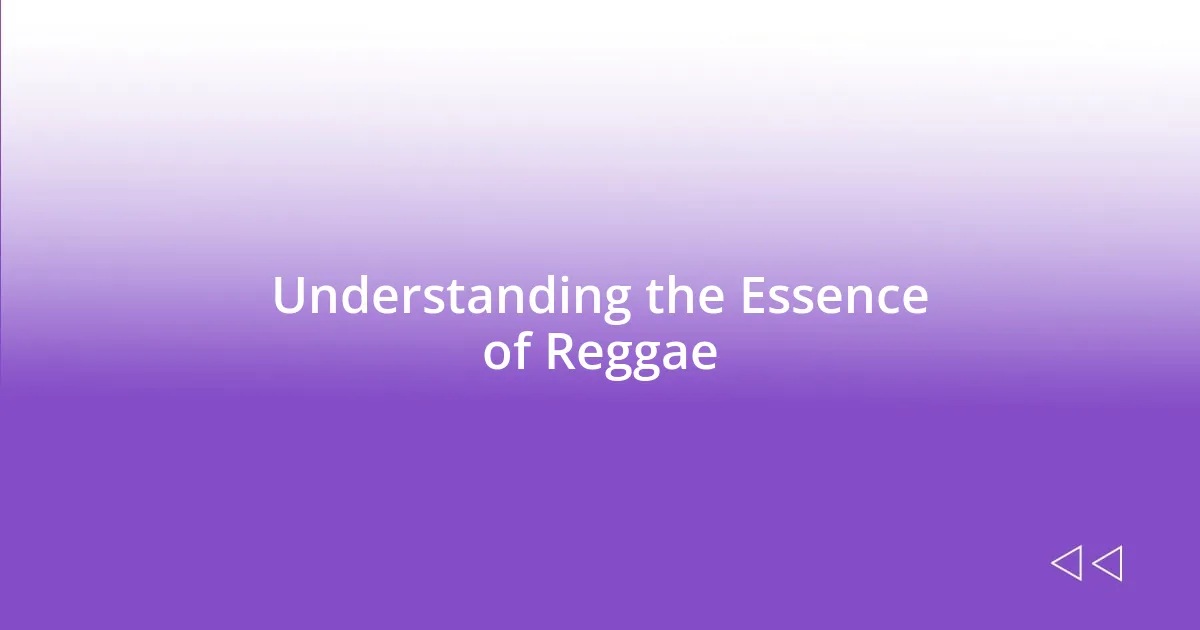
Understanding the Essence of Reggae
Reggae embodies a deep sense of cultural identity, rooted in the experiences of the Jamaican people. I remember the first time I listened to Bob Marley’s “One Love”—it brought tears to my eyes. The song’s message of unity and hope resonated with me, prompting me to consider: how often do we seek connections that transcend our differences?
The rhythmic beats of reggae create a groove that invites you to move your body and spirit. There’s something extraordinary about the way those offbeat rhythms intertwine with heartfelt lyrics, often reflecting struggles and joys of life. I can’t help but smile when I hear a lively reggae track at a gathering; it pulls everyone together, creating a shared moment of joy and camaraderie. Is there anything quite like the way reggae makes us feel alive in our shared humanity?
At its core, reggae is more than just a genre of music; it’s a profound expression of resistance and resilience. Each song tells stories of hardship while celebrating resilience. Listening to Peter Tosh’s “Equal Rights” always stirs something deep within me, making me reflect on the injustices that still exist today. This genre encourages us to think critically about our society and inspires action towards change—what role can music play in your life in sparking those conversations?
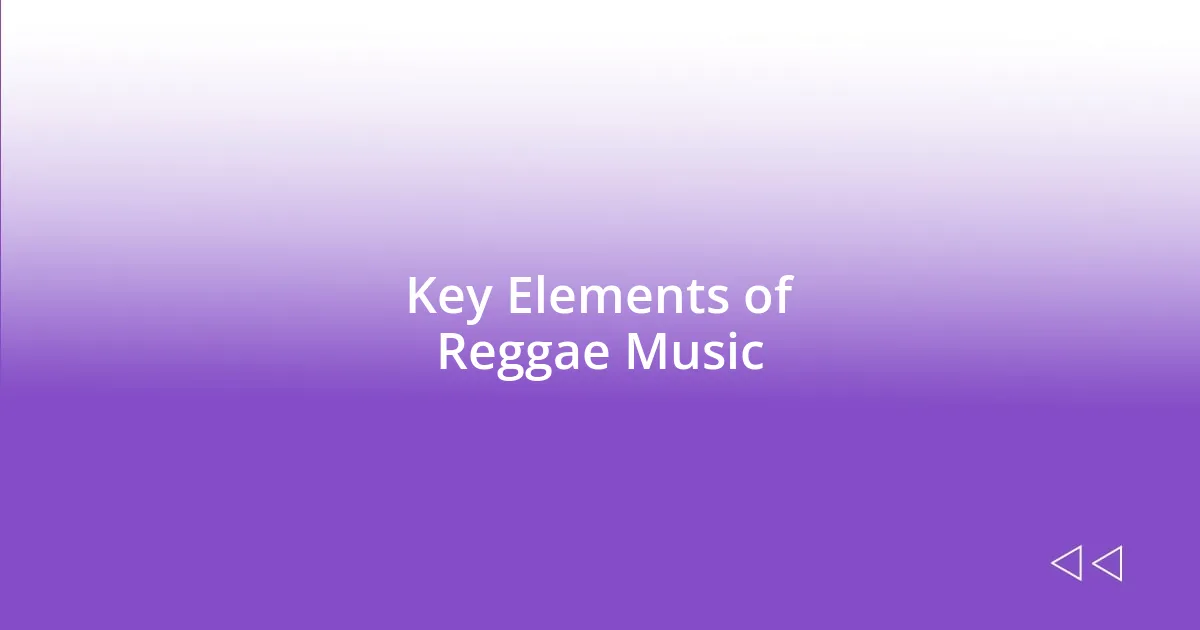
Key Elements of Reggae Music
The key elements of reggae music are rhythm, instrumentation, and lyrical themes, each playing a significant role in creating the genre’s distinctive sound and message. The rhythm often features a steady one-drop beat, allowing the bass and drums to drive the music forward while the guitars deliver that signature offbeat skank. Whenever I hear that bass line, it instantly transports me to sunlit days and carefree moments, echoing the laid-back spirit of Jamaica.
Instrumentation in reggae typically includes bass guitar, drums, and rhythmic guitar or piano. The bass is particularly crucial, shaping the groove that defines reggae. I remember jamming to a local reggae band and how the bass player’s energy ignited everyone in the crowd; it was a palpable connection. The way the instruments come together creates a warm, inviting atmosphere that feels like a hug—a perfect metaphor for the genre’s embrace of unity and love.
Lyrical themes in reggae music often explore social justice, love, and resistance, rooted deeply in cultural and historical contexts. I find that songs like “Redemption Song” resonate profoundly with listeners due to their powerful messages. Whenever I sing along, I feel a sense of empowerment, as if I’m part of something bigger. It’s remarkable how these themes encourage reflection and inspire action, making reggae not just music, but a vital aspect of cultural identity.
| Key Element | Description |
|---|---|
| Rhythm | Features a steady one-drop beat with offbeat guitar skanks. |
| Instrumentation | Includes bass guitar, drums, and rhythmic guitars or pianos. |
| Lyrical Themes | Explores social justice, love, and resilience deeply rooted in culture. |
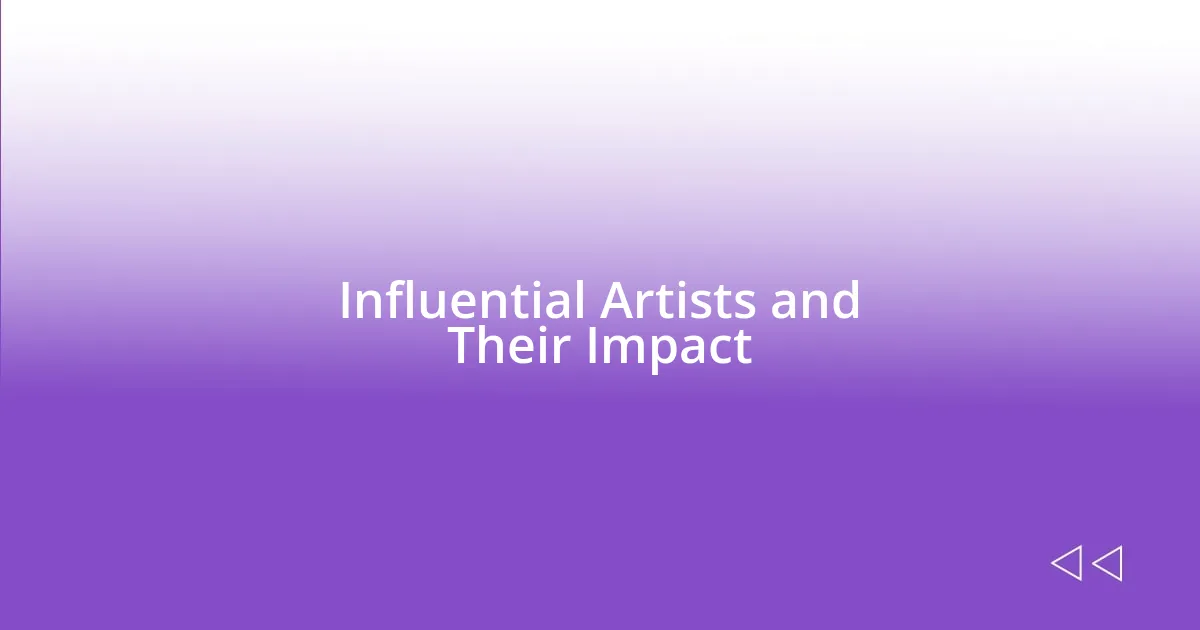
Influential Artists and Their Impact
When I think of influential reggae artists, Bob Marley inevitably comes to mind. His songs transcended borders and cultures, promoting messages of peace and unity that still echo in our hearts today. I recall attending a small music festival where a band performed “Three Little Birds”; as the crowd swayed and sang along, I felt a profound sense of connection to everyone around me, all of us momentarily swept away by the optimism of Marley’s lyrics.
Another monumental figure is Peter Tosh, whose powerful call for justice and equality opened my eyes to the struggles many face. Listening to him live felt like an awakening; his conviction was contagious, empowering us to raise our voices against injustice. His influence on reggae and social activism is undeniable and makes you realize how music can be a catalyst for change. Below is a list of some key artists and their impacts:
- Bob Marley: Pioneered reggae on the global stage, promoting messages of hope and unity.
- Peter Tosh: Advocated for social justice and equal rights through his powerful lyrics.
- Burning Spear: Emphasized the historical struggles of the Rastafari movement, enriching reggae’s narrative.
- Jimmy Cliff: Blended reggae with cross-genre appeal, introducing more people to the music through film and hit songs.
- Toots and the Maytals: Infused reggae with ska and rocksteady, making the genre vibrant and accessible to all.
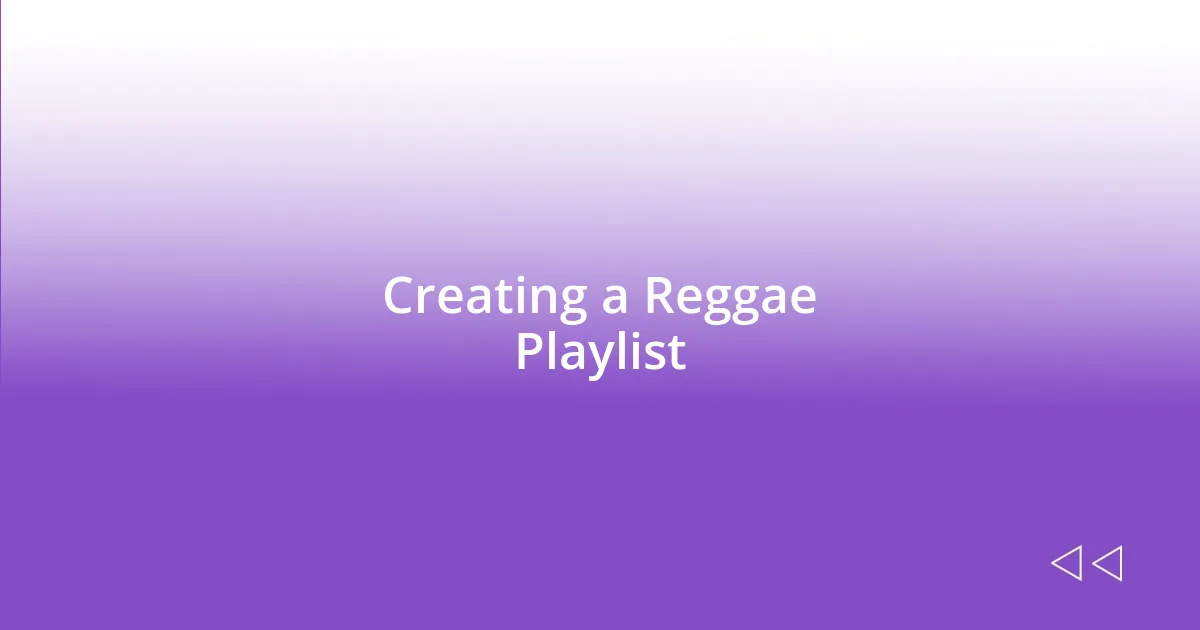
Creating a Reggae Playlist
When creating a reggae playlist, I like to start with a mix of classic tracks and modern interpretations. It’s fascinating how a timeless song like “One Love” by Bob Marley can sit seamlessly alongside newer hits from artists like Protoje. Have you ever felt that rush of nostalgia when an old favorite comes on? I know I do, and it reminds me why I fell in love with reggae in the first place.
Next, I pay close attention to the flow of the playlist. Transitioning from upbeat tunes to more mellow tracks is essential for maintaining that laid-back vibe. I remember curating a playlist for a sunset gathering with friends, ensuring that the selection guided us from lively dancehall beats to smoother rhythms as twilight approached. That gradual shift really created an atmosphere of unity and joy, drawing everyone into the moment together.
Lastly, I always include songs that spark conversations or encourage sing-alongs. Reggae lyrics often tell captivating stories or convey powerful messages. One time, during a laid-back reunion, we found ourselves diving deep into the meaning behind “Get Up, Stand Up” by Peter Tosh. It became more than just background music; it ignited a discussion about resilience and activism. Don’t you think that’s the beauty of reggae? It’s not just the sound; it’s the connection it fosters among people.
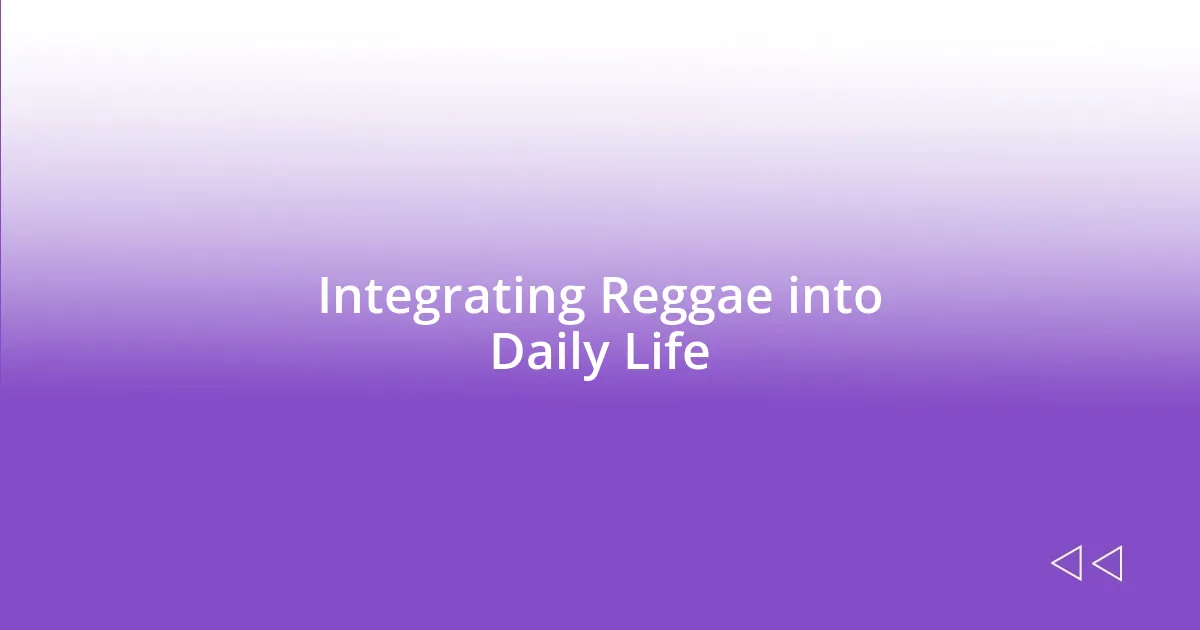
Integrating Reggae into Daily Life
Integrating reggae into daily life can truly transform your mindset. For instance, I often start my mornings by playing reggae music while I have my coffee; there’s something about the upbeat rhythms that sets a positive tone for the day. Have you ever noticed how a catchy beat can instantly boost your mood? I find myself smiling as I pour that first cup, feeling energized and ready to tackle whatever comes my way.
Incorporating reggae into activities can be equally rewarding. One evening, I decided to host a dinner party themed around Jamaican cuisine, complete with reggae tunes in the background. It was incredible how the music connected everyone—I could see my guests relaxing and bonding over the shared experience. The sounds of Toots and the Maytals echoed while we laughed and enjoyed jerk chicken; it genuinely made the atmosphere feel vibrant and welcoming.
I also love taking breaks during my workday to listen to a reggae track. It’s a simple yet effective way to recharge and refocus. I remember one particularly stressful day when just a few minutes of listening to Jimmy Cliff’s “You Can Get It If You Really Want” lifted my spirits and reignited my motivation. Have you ever felt the power of a song to shift your mindset? For me, it’s a regular reminder that rhythm and melody can also be forms of self-care, infusing my day with positivity and inspiration.
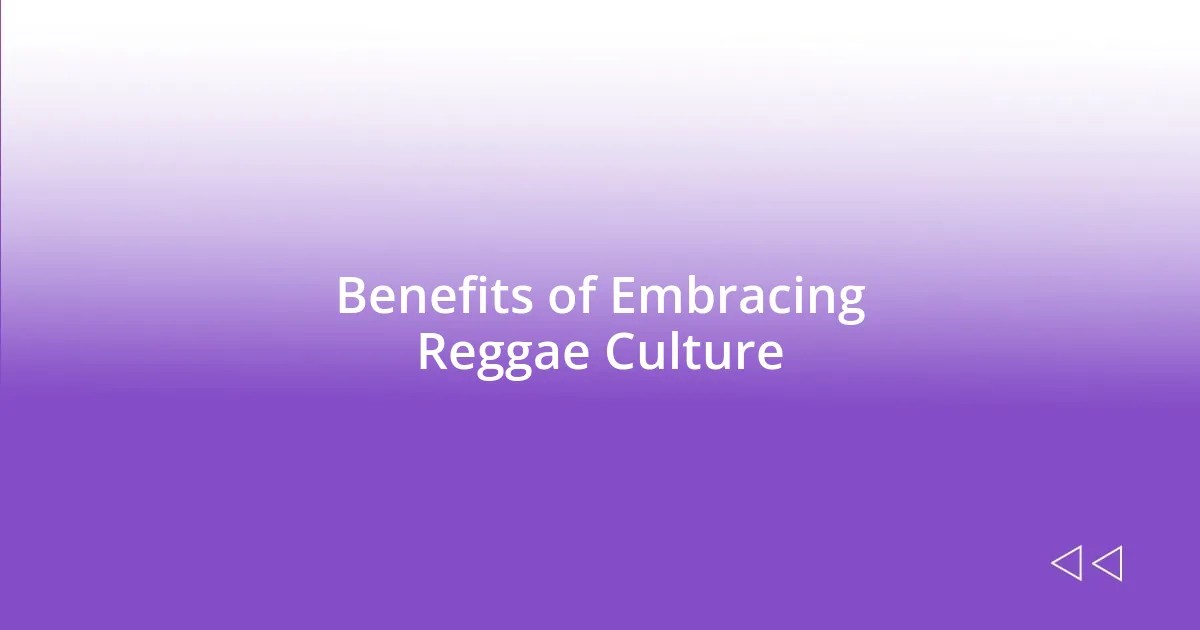
Benefits of Embracing Reggae Culture
Embracing reggae culture brings a vibrant sense of community and inclusivity. I can recall attending a local reggae festival where everyone, regardless of their background, came together to celebrate music and culture. It felt like one big family, dancing and singing in unison. Have you ever been part of such an experience that transcended differences? That day reinforced my belief in reggae’s power to unite people through a shared love for the rhythm and lyrics.
On a deeper level, reggae culture often promotes messages of peace and social justice. I remember vividly when I discovered the profound lyrics behind “Redemption Song” by Bob Marley; they sparked something in me. The themes of emancipation and hope resonated, reminding me of our collective responsibility to uplift one another. Isn’t it refreshing to engage with music that not only entertains but also educates and inspires change? When I listen to reggae, I’m constantly reminded of the importance of standing up for what’s right.
Beyond just music, immersing myself in reggae culture has broadened my understanding and appreciation of Jamaican heritage and history. I once spent an afternoon cooking traditional Jamaican dishes while learning about their origins. As I chopped veggies for a hearty callaloo, I felt connected to a culture steeped in resilience and creativity. Does food not have a magical way of bringing history to life? It deepens my respect for the stories behind the sounds, enriching my experience of reggae in a way that goes far beyond mere entertainment.
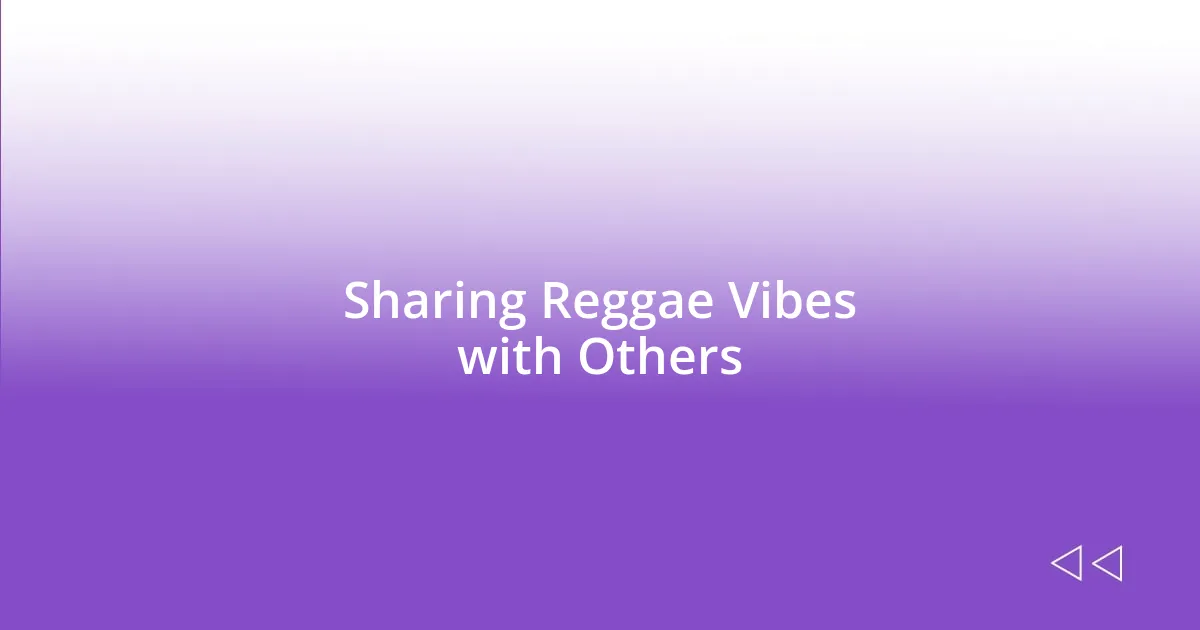
Sharing Reggae Vibes with Others
Sharing reggae vibes with others can create some of the most unforgettable moments. I remember one sunny afternoon when my friends and I gathered for a chill backyard barbecue. As soon as I hit play on my favorite reggae playlist, everything transformed—it felt like the sun shone a little brighter, laughter flowed a bit easier, and every bite of grilled food tasted even more delicious. Have you ever experienced music changing the atmosphere of an entire gathering?
One of my favorite ways to share these vibes is through community events. I once joined a neighborhood block party where everyone came together to celebrate with music, food, and dance. When the DJ mixed some classic Bob Marley with modern reggae artists, it was impossible not to join in. Watching people of all ages—kids, grandparents, and my peers—dance and sing made me realize how reggae truly brings us together, creating connections that go beyond words.
I also find joy in exchanging playlists with friends who haven’t yet delved into reggae. Introductions to artists like Protoje or Jah9 often spark deep conversations about the messages in their music. One time, after sharing a track with a friend, we spent hours discussing the themes of resilience and love that are so prevalent in reggae. Have you ever had a musical discovery turn into an eye-opening conversation? It illuminated how the beauty of reggae goes far beyond the sound—it’s about sharing perspectives and stories that resonate with all of us.
